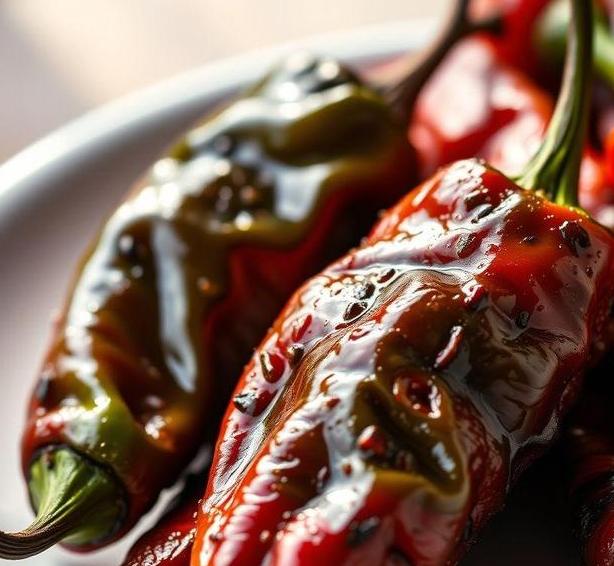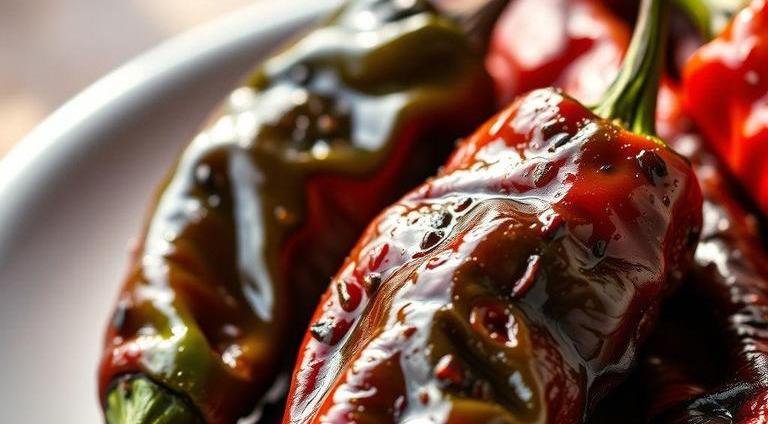Roasted chili peppers are a staple in many kitchens, known for their smoky flavor, tender texture, and ability to enhance the complexity of various dishes. Whether you’re preparing a hearty stew, a zesty salsa, or a spicy marinade, roasted chili peppers can take your recipes to the next level. However, like any food item, their longevity and proper storage are essential to maintaining their flavor and safety.
If you’ve ever found yourself wondering how long you can store your perfectly roasted chili peppers before they go bad, or whether they’ll spoil in a few days, you’re not alone. Understanding how to preserve roasted chili peppers and recognize signs of spoilage can help prevent waste and ensure that you’re always enjoying fresh, flavorful peppers when you need them.
Can Roasted Chili Peppers Go Bad?
Yes, roasted chili peppers can definitely go bad. Like most cooked or perishable foods, they have a limited shelf life. The roasting process itself doesn’t make them immune to spoilage; in fact, the moisture content and exposure to air can make roasted chili peppers more susceptible to bacterial growth, mold, and other forms of decay.
While fresh chili peppers can last quite a while in the fridge or on the countertop, once they’re roasted, their preservation requirements change. Roasting peppers softens their skins, breaks down some of the cellular structure, and removes some moisture. This process can create a more vulnerable food item that needs special attention when it comes to storage.
Shelf Life For Roasted Chili Peppers

The shelf life of roasted chili peppers varies depending on how they’re stored. When kept properly, they can last:
- In the fridge (whole or chopped): Typically 3 to 7 days.
- Frozen (whole or chopped): Roasted chili peppers can last 6 months to a year in the freezer without losing too much flavor or texture.
- In oil (if stored in a jar with olive oil): Up to 2 weeks, but it’s important to check for spoilage regularly.
These estimates depend on various factors, such as the type of pepper, how fresh it was before roasting, and how well you’ve stored it. Roasting peppers concentrates their flavor and softens their skins, making them more delicate. Proper storage is key to keeping them from spoiling prematurely.
Common Signs Of Spoilage
Knowing the signs of spoiled roasted chili peppers is essential to avoid consuming food that could be harmful. Here are the most common signs of spoilage to watch out for:
- Unpleasant odor: Freshly roasted chili peppers have a rich, smoky aroma. If your peppers start to smell sour, rancid, or “off”, it’s time to toss them.
- Mold growth: Any visible mold, whether white, green, or black, on the skin of the peppers or around the storage container, indicates spoilage. Mold can form in moist environments, so be especially cautious if you’ve stored peppers in oil.
- Slimy texture: If the skin of the peppers becomes slimy, this is a clear indication that they’ve started to decompose. Roasted peppers should remain firm and slightly soft, but not slimy.
- Discoloration: If the color of the pepper changes dramatically-such as turning a dull, dark brown or black instead of keeping its roasted, vibrant red or green-it might have started to spoil. Some darkening is normal, but excessive discoloration could be a sign of bacterial growth.
- Soft and mushy consistency: While roasted peppers are naturally softer than fresh ones, they should not be overly mushy or falling apart. If they feel soggy or ’wet’ to the touch, discard them.
How To Store Roasted Chili Peppers?

Proper storage is the key to prolonging the freshness of roasted chili peppers. Here are the best ways to store them based on whether you plan to use them within a few days or want to keep them for months:
-
In The Refrigerator (short-term Storage)
- After roasting, let the peppers cool completely.
- Remove the skins if desired (this is optional and depends on your recipe preference).
- Store them in an airtight container, such as a glass jar or a plastic food storage container.
- If you’ve chopped the peppers, place them in a sealed bag or container.
- They will last for about 3 to 7 days in the fridge.
-
In The Freezer (long-term Storage)
- If you’re not planning on using your roasted peppers right away, freezing them is a great option.
- After cooling, place them on a baking sheet in a single layer and freeze them for a few hours. This method prevents the peppers from sticking together.
- Once frozen, transfer them to a freezer-safe bag or container. This method helps preserve the texture and flavor.
- Roasted chili peppers can last up to 6 months in the freezer.
-
In Oil (for Added Flavor And Preservation)
- If you like, you can store roasted peppers in olive oil to enhance their flavor and increase their shelf life.
- Place the peppers in a jar and cover them with olive oil. Make sure the peppers are fully submerged to prevent air exposure.
- Stored in the fridge, they can last up to two weeks.
- Be careful with this method, as improper storage can lead to bacterial growth. Always use clean utensils to remove the peppers from the oil to prevent contamination.
Expert Tips
- Blanch Before Roasting: If you plan on freezing roasted chili peppers, blanch them first. This prevents the skins from becoming too tough during freezing and can help preserve the flavor.
- Use a Vacuum Sealer: If you’re storing roasted chili peppers long-term, a vacuum sealer can work wonders. Removing all air from the packaging helps preserve both flavor and texture. You can freeze roasted peppers in vacuum-sealed bags, which will last even longer than the typical freezer method.
- Oil with Caution: While storing roasted chili peppers in oil sounds delicious, it’s important to be cautious. Oil can create an anaerobic environment, which is ideal for the growth of botulism bacteria. Always store oil-packed peppers in the fridge, and consume them within a short period (2 weeks max).
- Check For Freshness Regularly: If you’re storing roasted chili peppers in the fridge or freezer, check them for any signs of spoilage or freezer burn. This will ensure you don’t miss any early indicators of rot.
FAQs
Can Roasted Chili Peppers Go Bad?
Yes, roasted chili peppers can go bad over time if not stored properly. They can spoil due to bacterial growth, mold, or degradation of their quality.
How Long Can Roasted Chili Peppers Last?
Roasted chili peppers typically last 1-2 weeks in the refrigerator when stored in an airtight container. They can last several months if frozen properly.
How Can You Tell If Roasted Chili Peppers Have Gone Bad?
Signs that roasted chili peppers have gone bad include mold growth, an off or sour smell, soft or mushy texture, and color changes. If they appear slimy or discolored, they are no longer safe to consume.
Can Roasted Chili Peppers Be Frozen To Extend Shelf Life?
Yes, roasted chili peppers can be frozen to extend their shelf life for up to 6 months. Be sure to remove any seeds and store them in an airtight container or freezer bag.
Can You Eat Roasted Chili Peppers Past Their Expiration Date?
It’s not recommended to eat roasted chili peppers past their expiration date, as their quality and safety may be compromised, especially if they’ve been improperly stored.
What’s The Best Way To Store Roasted Chili Peppers?
The best way to store roasted chili peppers is in an airtight container in the refrigerator for short-term storage. For longer storage, freezing is the most effective method.
Do Roasted Chili Peppers Spoil Faster Than Raw Peppers?
Yes, roasted chili peppers can spoil faster than raw peppers due to the loss of protective skins during the roasting process. The roasting also alters their moisture content, making them more prone to spoilage.
Can You Store Roasted Chili Peppers In Oil?
Yes, you can store roasted chili peppers in oil to prolong their shelf life. However, ensure the peppers are fully submerged in oil to prevent contamination and always store them in the refrigerator.
What Happens If You Eat Spoiled Roasted Chili Peppers?
Eating spoiled roasted chili peppers can lead to foodborne illnesses. Symptoms may include stomach cramps, nausea, vomiting, or diarrhea, depending on the type of bacteria or mold present.
How Can You Prevent Roasted Chili Peppers From Going Bad?
To prevent roasted chili peppers from going bad, store them in an airtight container, refrigerate or freeze them immediately after roasting, and ensure they are completely cooled before storing.